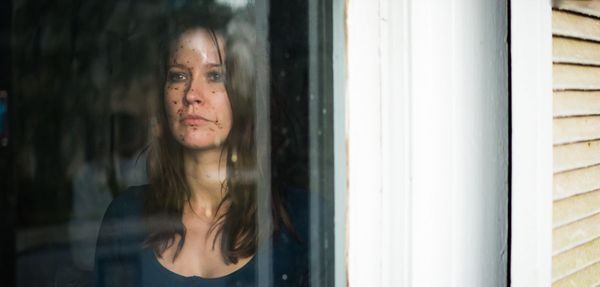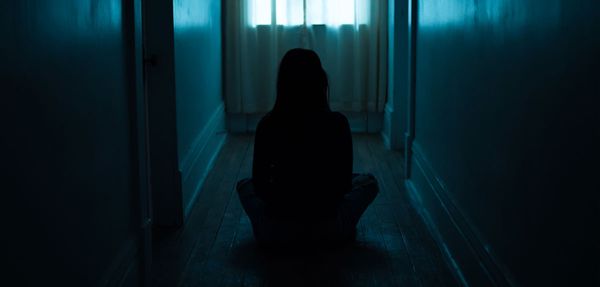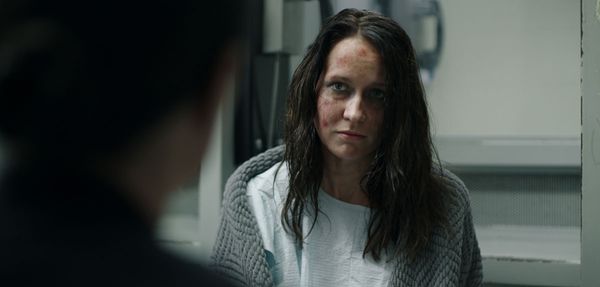
Anna Camp has gone dark. The actor known for her sneakily villainous roles in "True Blood" and "The Unbreakable Kimmy Schmidt" — as well as her musical part in the "Pitch Perfect" film series and multiple stints on Broadway — appears for our interview with her famous blond hair a deeper shade.
Camp has a new film out which also marks a new direction for her. She stars as Cora in "From Black," a horror film where Camp's character, a mother grieving the disappearance of her young son and struggling with addiction, is presented with an unbelievable offer: a chance to discover what happened to him, for a price. Camp describes the film as "like nothing I've ever read before or done before."
The southern-born actor, who appeared on Broadway alongside Daniel Radcliffe in "Equus," and says her dream role would be playing Blanche in "A Streetcar Named Desire," has a slew of other new projects in the works. Many seem like departures from the roles most closely identified with her career so far. She's shooting a Peacock series "Hysteria!" about the 1989 Satanic panic, had a film that recently premiered at Sundance and just wrapped a stoner comedy called "Nuked." She says about playing complicated, varied characters, "You always want to try to stay ahead of the audience."
Camp is both a musical theater devotee and a big horror film fan. She talked about both with Salon, along with her emotional connection to acting and the physical challenges of taking on a role like Cora in "From Black."
This interview has been lightly edited for clarity and condensed.
Did you always know that you wanted to perform? How did you get started?
Way back. I started acting in second grade, if you can believe it. My sister is seven years older than me, and she was taking acting classes. I was like, what's she doing? I want to do this too. So my parents put me in class. I remember reciting a poem in front of my class at a very young age and getting very emotionally moved by it. I remember just time freezing, you know. I started crying because I was so affected by the things that I was saying at a very young age. I think that's when I felt like I wanted to be an actor and a storyteller. Whatever that emotional connection was going on, I've been chasing that moment ever since, in a way, to find that resonance . . . Very weird, I think, for a little kid to be feeling all these emotions when they're in second or third grade!
Hey, you've gotta put those emotions somewhere. Performing is a good place. You have also appeared on Broadway multiple times. When you first started, did you see yourself as a theater actor, or a film and television one? Did you have that clear journey in mind?
I thought I was going to be doing theater and only theater for the rest of my life. I was like, I'm gonna be really broke, but really creatively fulfilled. And that's OK. So I went to New York, I graduated school — I'm not gonna say the year — but I graduated college and went straight to New York. I started booking theater jobs, thank God. I was doing regional theater, and then I got cast in my first Off-Broadway play. From that I got cast in my first Broadway show . . . Alan Ball came to see it and subsequently cast me in "True Blood," which actually brought me out to Los Angeles. I started falling in love with the medium of film and television. It was really exciting to take what I had learned on stage and translate it into this much more intimate, subtler space as an actor. I learned a lot when I was on "True Blood." But I never thought I would ever be in TV and film. I always thought I was just going to be on stage.
That makes sense, because you're a singer as well. You've sung in multiple projects, including all the "Pitch Perfect" movies. Is music something you try to balance with acting?
I would love to do another musical movie or musical TV show. I love singing. It's something that I never really considered myself: a real singer. I always tell people, I'm an actor who can sing. But I listen to all sorts of music. I would love to learn how to play a musical instrument. I used to know how to play the ukulele, but I'd love to learn how to play guitar and do something like "Daisy Jones & The Six." I think it's a great, great TV show. I would love to play a country music artist, which would use my South Carolina roots because that's where I'm from originally.
"I began to inhabit this person physically in a way that I've never really gotten to do before. Because I always sit up really straight and play these type A women."
It was nice to take a divergent path from that for a while because I think a lot of people kind of pigeonholed me into this "Pitch Perfect" singing and dancing type A girl category. I've definitely taken a departure from that, but I love to sing and would always be down to do something in another project forever . . . It's really fun to sing and it really enhances the storyline and the moment and the characters. It's this beautiful sort of fantasy. I'd always been a musical theater fan growing up.

It's interesting you talk of being worried about being typecast into this "Pitch Perfect" kind of role, because your newest role in "From Black" is very different. Can you describe your character in that film?
I play Cora, who is a recovering drug addict, dealing with the disappearance of her son. Her son disappeared five years earlier. And she definitely played a part in his disappearance, because she was definitely not a good mother . . . We follow her story through the things that she's trying to do to get him back, or the chance to see him again, or to make up for what she did wrong. You know, she's a screwup, she's not great. Even throughout the film, she's given these tasks, these rituals to go through — and she even messes those up. So you get to see this person who is incredibly flawed, incredibly guilt ridden, but also who is through and through a mother who cannot give up hope of seeing her child again. The director, Thomas Marchese, he always said, "Cora is broken, but she's a fighter." So that was that balance that we tried to walk constantly. She's a broken person, but she's not giving up hope, and she's going to continue to fight.
How did you prepare for a role like that?
To prepare yourself to play somebody who's lost their child — I don't know if you can ever actually mentally prepare yourself to be there. But I got to spend some time with [Eduardo Campirano], the young actor who played Noah, and I got to really love him as a person and find things that I loved about him — and then I would just close my eyes and think: what if he was gone? What if that sweet little kid was completely ripped off the face of the earth, and I had something to do with that? How would I feel about that? . . . If you put yourself in that place, emotionally things will start to come up. That evolved into who the character was. I would also listen to music a lot. There's a specific song that I would play over and over and over that became Noah's theme to me, that really represented him as my child. I would listen to it and it would put me in the emotional place.
"I think that fear is the strongest emotion."
As an actress, I was just dying to get to play a role that was so different my body would start to hunch over. I began to inhabit this person physically in a way that I've never really gotten to do before. Because I always sit up really straight and play these type A women, it was really refreshing for my body to inhabit a completely different human being than I've ever gotten to play before . . . It was heartbreaking every day to play that.

I love horror movies. I love getting scared and I think that's why I like horror movies because you get to give up control when you watch them. It's the same thing when people ride roller coasters or do things that frighten them. There's this adrenaline. I love giving up that kind of control. My favorite horror movies are Hitchcock films. I love "Psycho." I love "The Birds." I saw "Poltergeist" at a very young age. It really scarred me. I became frightened of the television. I don't think my parents should have let me see that at that age! . . . But I think just putting yourself in that place of like: there's something behind you. There's a stillness. There's a listening.
There's a lot of acting alone that I do in the movie as well. But you're not alone, right? The seeker is following me. There's just something really beautiful about [Cora], I think, because it taps into a place that you shouldn't experience all the time too. There's a danger there, which I find really exciting as an actress to get to reach those levels, because thank God, I'm not walking around terrified every day of my life. It was just really exciting to get to tap into those places.
I'm a horror fan, too, and I think it's interesting that you started the interview talking about emotion and the emotion of acting, because I feel horror movies can be so emotional. They are much deeper in that psyche and trauma sense.
I think that fear is the strongest emotion. When you really think about how terrifying some of the things are that Cora goes through in this film, it's a very powerful and also just thrilling place to put yourself. I'm not afraid of that. I'm not afraid of feeling terror and fear. I want to see how far I can go. I think the director was really excited about that. There are shots in the movie — I don't really watch myself that often, but I watched this — where my pupils are dilating. I didn't even know that they could dilate as big as they are. I was actually scared watching it, even though I knew what was going to happen.

It was physically hard. There was a lot of running. There's a lot of being wet, being doused with water and running.
A lot of screaming, which — you're very good at screaming.
A lot of screaming. A lot of crying. I was dehydrated because I was crying all the time. So I would have to drink water and Gatorade all the time. Sometimes I would be crying but I had no tears because there was no water left in my body. It was very physical. It was great, though. I had a great time.
"There's a lot burning inside, but we're taught not to show that."
You've also had parts like your role in "Kimmy Schmidt" where your character is very sunny on the outside, but very intense and potentially dark and devious on the inside. How do you handle that as an actor?
Those are the most delightful roles to play because you get to portray this one thing: this glossy, pretty, perfectly quaffed exterior. And what that mask is hiding is very tortured, dark. In "Kimmy Schmidt" she's almost this masochistic soul inside. As an actress, I love playing the dichotomy of those two things at once. Because it gives me so much to play and so much conflict also to not let it out. Don't show what's really happening inside of you, because people will be scared of that. And you'll scare them off and you're not perfect.
You know, I think a lot of that came from my being raised in the south as a southern woman. They don't call us Steel Magnolias for no reason. There's a lot burning inside, but we're taught not to show that. I think that's why I love playing women who are so complicated and so surprising, because you don't know the fire that's actually burning within them. And they're trying to hide it all the time. They're my favorite characters.
As Cora in "From Black," your character doesn't always hide as much. Her trauma and anger and grief are very much out there. She also talks about how she's done pretending. She's done being nice and letting people say these platitudes they say to her about her child. Was it hard being that vulnerable for the role?
"Nothing can expose a person more than terror."
It's definitely hard. I was surrounded by incredibly talented actors like Jennifer Lafleur, my sister, and John Ales who played Abel. He's just absolutely incredible. There's a shell. There's a hard exterior to Cora in a different sense than the other characters I've played, but there's still a bit of a mask that I started out with and then you get to crack her open slowly throughout the film, and more vulnerability comes out of her. It's the trick of playing that it's hard. I'm playing that it's hard for Cora to let this out of her. It's such a fascinating thing to talk about, acting and the process, because you have to delicately balance who the person is inside, who they're presenting to the person they're in the scene with, and then slowly if that person is changing them and allowing little cracks in their facade to come through.
There were a lot of scenes where I got to shed the shell of who Cora was. And being afraid is also something. There's no mask when you're that terrified. That's your true soul being exposed. Nothing can expose a person more than terror and fear.
And the biggest terror, I think, is always inside us, right? It's the past or it's the future. It's what's happened to us or what we've done.
Absolutely. Who you are as a person and knowing that you're a you're a f**kup. You're not perfect, you've caused all of this. That's the most terrifying thing to know and to admit to yourself.
Is this something you would like to continue doing, balancing these lighter, more cheerful or happier roles with these sort of darker parts?
I think, yes. They work hand in hand as an artist. You can't have comedy without tragedy and vice versa. And as a well-rounded artist and an actress, I can't just do these types of horror movies over and over. I'd probably be miserable. So to be able to switch back and forth and have a wonderful balance, I think creates a whole, well-rounded artistic career, which I hope to have. I'm constantly searching for both things to balance.
You talked about "True Blood" and how much you learned from that show. Your character was so interesting because, you know, she's one of the bad guys. Was it hard being the villain on the show?
Oh, it was so fun. Oh God, I love being the villain. It's been refreshing to not play the villain recently. But I love it. Those are the most exciting roles to get to play. It's like hopefully you love to hate me on "True Blood." The villains get some of the most incredible lines, they get the most screwed up things to do, and the way they go about it. It's wickedly fun to play the villain. I love it.
"From Black" is streaming on Shudder. Watch a trailer via YouTube below:







